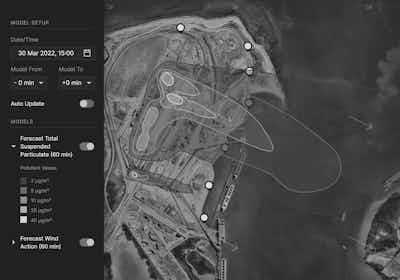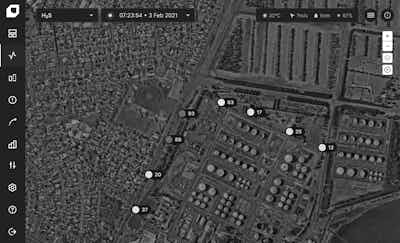Customer Stories
From paper-based compliance reporting to proactive air quality management at a metal smelter in Australia
One of the largest smelting operations in Asia-pacific needed to reduce costly resources for air quality emissions mitigation and streamline paper-based environmental reporting processes.

Located in Australia, the smelting operation is an important part of local economy and employs several hundred people. It is a large multi-metal smelter, producing lead, silver and by-products including Sulphuric acid.
Industries
Platforms
Challenge
The smelting operation in Australia was unable to get a quick and reliable view of its air quality emissions impact in order to mitigate unfolding events and minimise unplanned stoppages. Ground staff at the site were challenged with time-consuming environmental monitoring methods and inefficient technology that’s difficult to access through various firewalls.
Historically, it’d been difficult for teams at the smelter to plan for emissions events and high-risk weather. Operators were presented with too many options from manual and paper-based methods of environmental management. Site managers at the smelter concluded that it was no longer possible to manage such a diverse set of risks and the associated costs of these risks using data-intensive applications that cannot rapidly evolve to meet the emerging challenges.
“Envirosuite technology is now an integral part of enabling our smelter to operate responsibly and mitigate emissions impact. Our team is now able to act on any potential issues much faster and collaborate across departments to get to the bottom of emissions issues.”
- Sustainability Manager, South Australian Smelter.
Solution
To stay on top of its environmental impact more efficiently while saving costs on emissions mitigation, the smelter contracted Envirosuite for its environmental intelligence platform—EVS Omnis. The site managers use EVS Omnis’ interactive dashboard to visualise real-time environmental monitoring data from multiple parameters.
Users can configure threshold alerts within the system and receive real-time notifications to act on site-generated emissions causing exceedances.

EVS Omnis’s predictive air quality management capabilites also provided the ground staff with site-specific weather data, emissions modelling and multi-day risk forecasting for up to 72 hours in the future. The ability to model high-risk events allowed the smelter management to plan operations around unexpected weather changes and minimise unplanned stoppages.
Results
Since the implementation of EVS Omnis, the smelter now has a complete situational awareness of its environmental impact at any time and spends significantly less time and resources on mitigating site generated emissions. Alerts for potential threshold breaches notify operational teams to immediately identify the monitors at risk of exceedance and gain an immediate understanding of hotspots in their site where they should focus costly resources and mitigation efforts.
Environmental reporting has now been streamlined across the smelter. Manual analysis of fragmented data from multiple monitor locations has been replaced by tailored environmental impact reports. Automated environmental reporting now saves valuable time and resources for the business, while allowing them to communicate to stakeholders with highly accurate data.

Operational teams are now increasing site efficiency by planning low-risk and low-priority activities during high-risk weather conditions to avoid any downtime from site-generated emissions. Site-specific weather data available within EVS Omnis allows production managers to confidently plan operational activities multiple days in advance to avoid unplanned stoppages due to changing weather conditions.
Find out more in detail about how the metal smelter used environmental intelligence to:
Monitor threshold exceedances of site-generated emissions.
Plan operational activities around high-risk weather events
Identify the source of community complaints.
Click here to download our free case study.